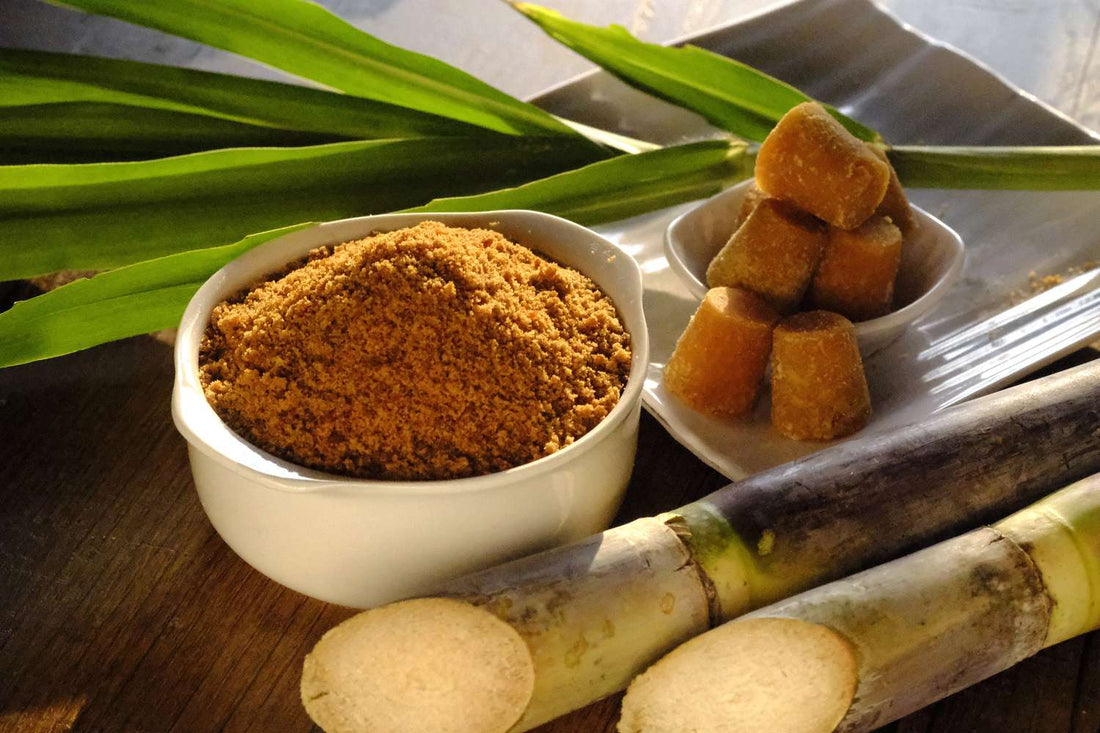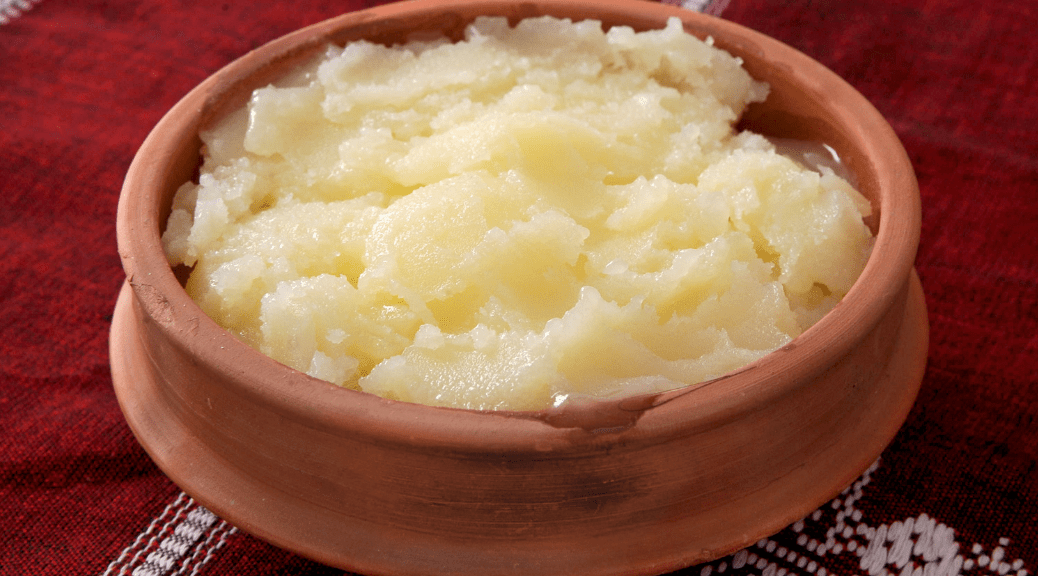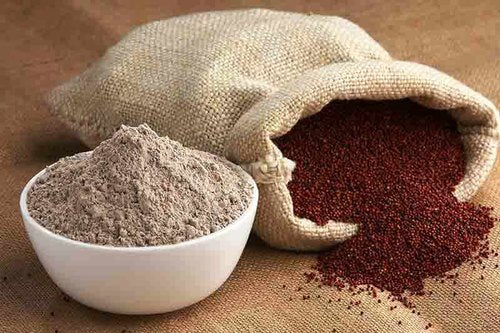






Is Jaggery Better Than Sugar
When considering sweeteners, you might wonder if jaggery is a better choice than refined sugar. Jaggery boasts a range of nutrients, while sugar offers little more than empty calories. You could benefit from its steadier energy release and digestive advantages. However, moderation is key, as even natural sweeteners can pose risks. Curious about how these two stack up in terms of nutrition and health? Let’s explore the details further.
Nutritional Comparison of Jaggery and Sugar

When you compare the nutritional profiles of jaggery and sugar, you'll notice some striking differences.
Jaggery is less processed and retains more nutrients than refined sugar. It contains essential minerals like iron, magnesium, and potassium, which are largely absent in sugar.
In terms of calories, jaggery has a similar caloric content to sugar but offers more nutritional value. Additionally, jaggery has a lower glycemic index, meaning it can provide a steadier energy release.
While sugar mainly consists of sucrose, jaggery contains a mix of sucrose, glucose, and fructose, contributing to its unique flavor and health attributes.
These differences highlight why many people consider jaggery a more wholesome alternative to sugar in their diets.
Health Benefits of Jaggery

While many people enjoy sweets, opting for jaggery over refined sugar can provide several health benefits.
Jaggery is packed with essential nutrients, including iron, calcium, and magnesium, which can help boost your immune system. It also acts as a natural detoxifier, aiding your liver in flushing out toxins.
By choosing jaggery, you may experience improved digestion, as it stimulates the production of digestive enzymes. Additionally, jaggery can help regulate body temperature, making it a great choice during colder months.
It's also believed to enhance energy levels, giving you a healthier alternative to sugar crashes.
The Glycemic Index: Jaggery vs. Sugar
Understanding the glycemic index (GI) is crucial for making informed choices about sweeteners, especially when comparing jaggery to refined sugar. The GI measures how quickly foods raise your blood sugar levels.
Jaggery typically has a lower GI compared to refined sugar, meaning it causes a slower, more gradual increase in blood sugar. This can be beneficial for managing energy levels and cravings. While jaggery still contains sugar, its higher nutrient content might help with better overall metabolic responses.
On the other hand, refined sugar has a high GI, leading to rapid spikes and crashes in blood glucose, which can affect your energy and mood. Choosing jaggery could be a smarter option for those mindful of blood sugar management.
Culinary Uses of Jaggery
Jaggery offers a delightful alternative to refined sugar in various culinary applications.
You can use jaggery in desserts like kheer, where its rich flavor enhances the creamy texture. Try adding it to your chai for a warm, caramel-like sweetness that complements the spices.
In savory dishes, jaggery balances flavors, especially in curries and marinades, giving them a unique depth. You might also enjoy it in baking; it can replace sugar in cookies and cakes, resulting in a moist, flavorful treat.
Additionally, jaggery works well in traditional sweets like laddoos and halwa, adding a wholesome touch. Its versatility makes it a fantastic ingredient to experiment with, bringing a natural sweetness to your favorite recipes.
Potential Drawbacks of Jaggery
Using jaggery in your cooking can certainly add unique flavors and enhance your dishes, but it’s important to consider some potential drawbacks.
One issue is its high calorie content; jaggery packs quite a punch in terms of sugar, which can lead to weight gain if consumed excessively. You might also find that it has a slightly gritty texture, affecting the mouthfeel of certain recipes.
Additionally, while it contains some nutrients, it’s still a form of sugar and can spike your blood sugar levels. If you have diabetes, you'll need to be cautious.
Lastly, jaggery can be harder to find than regular sugar, making it less convenient for everyday use. Balancing these factors is crucial for mindful eating.
How to Incorporate Jaggery Into Your Diet
If you're looking to add a natural sweetener to your meals, incorporating jaggery into your diet can be both delicious and nutritious.
Start by replacing sugar with jaggery in your tea or coffee; it adds a unique flavor. You can also mix jaggery with warm milk for a comforting bedtime drink.
Try using it in baking—substituting jaggery for sugar in cookies or cakes can enhance taste and texture. Additionally, grate jaggery and sprinkle it over oatmeal or yogurt for a wholesome breakfast.
You can even use it in savory dishes like curries, where its sweetness balances spices. Experiment with different recipes to discover how jaggery can elevate your meals while providing essential nutrients.
Final Thoughts on Choosing Between Jaggery and Sugar
When deciding between jaggery and sugar, it's essential to consider health benefits, taste preferences, and how each fits into your lifestyle.
Jaggery offers minerals and antioxidants, making it a more nutritious choice for some. If you’re conscious about your health, jaggery might be the better option.
However, if you prefer a sweeter taste with a more refined flavor, sugar could be your go-to.
Think about how often you use sweeteners and in what context. For baking or beverages, sugar might blend better, while jaggery can add a unique twist to traditional recipes.
Ultimately, choosing between jaggery and sugar depends on your priorities and what aligns best with your dietary goals.
Make an informed decision that suits your taste and health needs.
Conclusion
In conclusion, while jaggery offers a more nutritious alternative to refined sugar with its unique health benefits and lower glycemic index, moderation is key. Choosing traditionally made, chemical-free options like Organic Soul Jaggery, which is prepared using age-old methods without additives or preservatives, can further enhance these benefits. It can elevate your meals and provide a steadier energy release, making it a great choice for those looking to reduce refined sugar intake. However, be mindful of portion sizes, especially if you're managing your blood sugar levels. Ultimately, choosing between jaggery and sugar depends on your personal health goals and dietary preferences.
